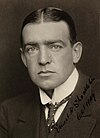Welcome! Check out today's deaths, recent deaths, or our deaths stats.
Feeling experimental? Head on over to our newest (and darkest) feature: Next-2-Die™ predictions
 Robert Falcon Scott
Robert Falcon Scott


Royal navy officer and explorer.
Born June 6th, 1868 in Plymouth. [ref]
Died March 29th, 1912 at 43 years old in Ross Ice Shelf (cachexia, hypothermia). [ref]
On the 29th of March 1912, Great Britain lost one of its most courageous and intrepid explorers, Robert Falcon Scott. The son of a local brewer, Robert Falcon Scott was born in Devonport, Devon, on June 6th, 1868, and he spent his youth in Devon and later in London. Although he was initially trained in naval engineering, Robert became an officer in the Royal Navy in 1886. It was during his time with the navy that Robert developed an interest in exploration, which would later surface in his decision to take part in the first expedition to reach the South Pole. In 1901, Robert set out for Antarctica on the Discovery Expedition as the leader of a three-ship expedition on board the ship, the Discovery. Although the expedition accomplished much, including the discovery of the Antarctic continent, it failed to reach the South Pole; the goal of the mission was thwarted by bad weather and bickering between Scott and the other members of his team. Nevertheless, Robert tried again and in 1910, he set out on the Terra Nova Expedition. This time, he and his men successfully reached the pole, beating their Norwegian rivals by some days. However, their return journey was hampered by extreme blizzards, exhaustion, dwindling food supplies and harsh weather. Tragically, Robert Falcon Scott and four of his companions died of extreme fatigue and starvation on the Great Ice Barrier, only eleven miles from a food depot. An exacting and courageous explorer to the very end, Robert Falcon Scott passed away at the age of 43, but left an indelible mark on the world of exploration. He will be remembered for his drive, determination and leading the first expedition to successfully reach the South Pole.
You might also be interested in...





Robert Louis Stevenson
Born November 13th, 1850 in Edinburgh.
Died December 3rd, 1894 at 44 years old
The idea is to die young as late as possible. Ashley Montagu